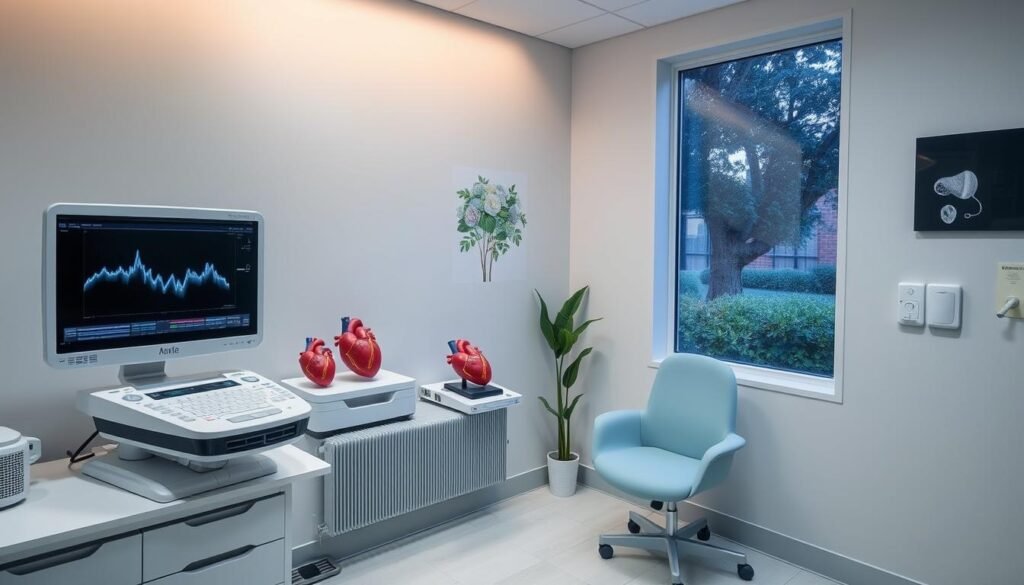
I recently visited a cardiologist, a big step for me. My family has a history of heart disease. This made me focus on my heart health even more.
Knowing that 6.7 million people in the US over 20 have congestive heart failure made me see how crucial regular check-ups are.
My dad had his first heart attack at 44 and passed away at 74. This made me realize I had to take care of my heart. The high healthcare costs in the US also made me think about the financial side of health care.
During my visit, I had an EKG, blood test, echocardiogram, Holter monitor, and stress test. These tests helped me understand my heart better.
About 25 million Americans don’t have health insurance. I felt lucky to have access to care. My visit was a big step in managing my heart health. I hope it inspires others to do the same, too.
Key Takeaways
- Regular cardiac consultations are crucial for maintaining heart health, even with a family history of heart disease.
- A cardiologist visit can include various diagnostic tests, such as an electrocardiogram (EKG) and echocardiogram.
- Understanding the financial implications of healthcare can help individuals prioritize their medical needs.
- Access to health insurance coverage can significantly impact one’s ability to receive medical care.
- Prioritizing heart health check-ups can help individuals take control of their well-being and reduce the risk of heart disease.
- Being proactive about heart health is essential, given the high prevalence of congestive heart failure in the US.
The Wake-Up Call: Why I Saw a Cardiologist 3 Years After My Dad Died
After my dad passed away, I knew I had to look after my heart. But I kept putting off going to the long-overdue doctor visit. It wasn’t until I felt some worrying symptoms that I knew I had to act fast. I learned how crucial preventive cardiology is and took charge of my health.
My family’s heart health history, including my dad’s death, made me decide to see a cardiologist. I knew that dad’s passing and heart health were linked. I didn’t want to face the same health issues. So, I started researching heart specialists and what to expect at my first visit.
Some common signs that might mean you need to see a doctor include:
- Chest pain or discomfort
- Shortness of breath
- Dizziness or lightheadedness
It’s important to listen to these symptoms and not ignore them. They could be signs of a serious problem.
By taking care of my heart health and scheduling a long-overdue doctor visit, I took the first step towards a healthier life. I urge everyone to make their heart health a priority and not delay doctor visits. It can greatly improve your health in the long run.
| Age | Heart Health Issue |
|---|---|
| 32 | Coronary bypass surgery |
| 45 | Aortic aneurysm |
Breaking Through the Fear of Knowing
After learning about my family’s heart health, I knew I had to get checked. I saw signs I couldn’t ignore. So, I made an appointment with a cardiologist to check my cardiovascular risk factors.
Grief and stress can really hurt our heart health. Heart attack risk goes up by 21 times in the first 24 hours after losing someone. This risk stays high for a week or two after.
Going to regular cardiologist appointments is key. It helps find heart problems early. This way, we can fix them before they get worse. By understanding the importance of regular check-ups, I can face my fears and take care of my heart.
- Regular health check-ups can help identify potential heart health issues early on.
- Understanding cardiovascular risk factors can help reduce the risk of complications.
- Scheduling a cardiologist appointment is the first step towards taking control of my heart health.
Finding the Right Cardiologist in India
When looking for a cardiologist, taking care of your heart is key. A heart checkup can spot problems early. A good cardiologist can guide and treat you. In India, many skilled cardiologists are available, but finding the right one is crucial.
Start by asking your doctor or friends for recommendations. You can also look up cardiologists online. Sites like the Cardiological Society of India list qualified doctors in your area.
Dr. Padmavati is a notable cardiologist in India. She started North India’s first Cardiac Catheterisation Laboratory. She also introduced the first DM course in cardiology in India. Her work inspires many and shapes cardiology in India.
When choosing a cardiologist, look at their credentials and experience. Reading reviews or asking questions during your first visit helps. This way, you can find the best cardiologist for your heart health.
Preparing for My First Cardiac Consultation
As I get ready for my first cardiac consultation, I know how key a cardiac evaluation is for my heart health. It will help my cardiologist spot any risks and create a plan for preventative care for heart health. This is very important for me, as I’m still managing heart health after a loss.
To get ready for the consultation, I’ll make a list of questions and concerns to talk about with my cardiologist. This might include:
- My family’s medical history
- My current lifestyle and habits
- Any symptoms or concerns I have
It’s crucial to be open and honest with my cardiologist to get the best care. By working together, we can create a plan for preventative care for heart health and managing heart health after a loss.

I’m excited for my first cardiac consultation and taking a big step for my heart health. With the right cardiac evaluation and preventative care for heart health, I’m confident I can lower my heart disease risk and live a healthy life.
| Cardiac Evaluation | Preventative Care for Heart Health | Managing Heart Health after a Loss |
|---|---|---|
| Family medical history | Lifestyle modifications | Counseling and support |
| Current lifestyle and habits | Regular monitoring schedule | Risk factor management |
What to Expect During Your First Cardiologist Visit
Visiting a cardiologist for the first time can be scary. But knowing what to expect can make it less intimidating. I’ve been through it, and understanding cardiac care helped me feel more in control. It’s also a way to honor my father’s health legacy.
The first step is a detailed medical history. You’ll talk about your lifestyle, family health, and any symptoms. You might also have tests like blood pressure checks, ECGs, and blood tests for cholesterol and glucose.
Talking to your doctor about heart disease risk factors is important. This includes high blood pressure, high cholesterol, or diabetes. Being open helps your doctor create a plan to keep your heart healthy. This way, you can follow in your father’s footsteps and take care of your heart.
Here are some important things to discuss with your cardiologist:
- Family medical history and its impact on your heart health
- Lifestyle changes like diet and exercise for better heart care
- Any symptoms you’re experiencing and how to handle them
Understanding My Heart Health Numbers
Getting my heart health numbers was a big moment for me. It came after dealing with loss and health worries. I learned how important knowing my family’s health history is. It showed me how it affects my health.
Heart disease is a big problem in the U.S. High blood pressure, cholesterol, and diabetes make it worse. These numbers are key to preventing heart disease.
Checking my blood pressure, cholesterol, and BMI is crucial. A normal blood pressure is under 120/80. High blood pressure starts at 140/90. Losing 5% to 10% of my body weight helps a lot. Women should keep their waist under 35 inches to avoid heart disease.
Important things to think about include:
- Family medical history: Having a relative with heart disease early on increases your risk.
- Lifestyle habits: Smoking, high blood pressure, high cholesterol, obesity, and genetics all raise your risk.
- Symptoms: Chest pain, shortness of breath, and extreme tiredness during activities can mean heart disease.

Knowing my heart health numbers helps me take action. I can change my lifestyle and check my numbers often. This way, I can manage my risk and live healthier.
| Health Indicator | Normal Range | High Risk |
|---|---|---|
| Blood Pressure | Less than 120/80 | 140/90 or higher |
| Cholesterol Levels | Less than 200 mg/dL | 240 mg/dL or higher |
| Body Mass Index (BMI) | 18.5-24.9 | 30 or higher |
Creating a Preventive Heart Care Plan
Understanding my heart health numbers showed me how vital cardiac care is. A heart health checkup helps spot risks early and plan to avoid them. Taking care of my heart means making lifestyle changes to lower heart disease risk.
My preventive heart care plan includes regular health checks. This includes watching my blood pressure and cholesterol levels. I also know about tests like echocardiograms and stress tests. By making smart lifestyle choices, I can lower my heart disease risk.
Lifestyle Modifications
I’ve started eating a balanced diet and exercising more. These changes have boosted my health and cut down my heart disease risk. I’ve also learned to manage stress and get enough sleep.
Regular Monitoring Schedule
Regular health checkups are key to tracking my progress. I see my cardiologist often to review my health and discuss any concerns. This helps me catch issues early and avoid bigger problems.
Risk Factor Management
Managing risks like high blood pressure and diabetes is crucial. I work with my healthcare team to manage these risks. By being proactive about my health, I can protect my heart and lower my disease risk.
Dealing with Family History and Genetic Factors
Learning about my family medical history has been key in my heart health journey. I’ve found out that many medical conditions are passed down through genes. This has made me realize how vital cardiac care is for me.
Understanding inherited conditions is a big part of managing family history and genetics. Heart diseases like high blood pressure and coronary artery disease can be inherited. For example, if a parent has an autosomal dominant heart condition, I have a 50% chance of getting it too.
- Get genetic testing to understand my condition and find mutations
- Do predictive genetic testing to find at-risk family members
- Keep a healthy lifestyle, including a good diet, exercise, and managing stress
By knowing my family’s medical history and taking steps to prevent heart disease, I can lower my risk. This journey has shown me the importance of cardiac care and the need to care for my heart. I urge everyone to take charge of their heart health by learning about their family’s medical history and making healthy lifestyle choices.
Building a Support System for Heart Health
Having a strong support system is key for managing heart health. When I went for my cardiologist appointment, I learned how important regular check-ups are. They help prevent and manage heart disease.
A support system includes family, a medical team, and community resources. Family members offer emotional support and help with healthy habits like eating right and exercising. A professional medical team guides on managing heart risks and creates a treatment plan just for you.
Community resources like support groups and online forums are also crucial. They give a sense of belonging and help with the emotional side of heart disease.
Building a strong support system and focusing on regular check-ups can help control heart health. It’s a long-term effort that needs commitment, patience, and the right support.
| Support System Component | Benefits |
|---|---|
| Family Support Network | Emotional support, lifestyle modification assistance |
| Professional Medical Team | Guidance on managing cardiovascular risk factors, personalized treatment plan |
| Community Resources | Sense of connection and community, emotional support |
Conclusion: Taking Control of Your Heart Health Legacy
Reflecting on my journey, I see how crucial it is to seek medical advice and focus on heart health. The heart health checkup I got has given me the power to manage my family’s heart health legacy. Knowing my personal and genetic risks helps me make better choices for my heart care.
It took me time to face my emotional barriers, but I’m glad I didn’t ignore the signs. By tackling the root causes and changing my lifestyle, I’m lowering my heart disease risk. I hope my story encourages others to value their heart health and seek medical help without delay.
Heart disease is a major killer worldwide, but we can fight it. With the right steps and support, we can lower these numbers. My experience teaches us that caring for our heart health is a big responsibility. It’s a legacy we can leave for our loved ones.